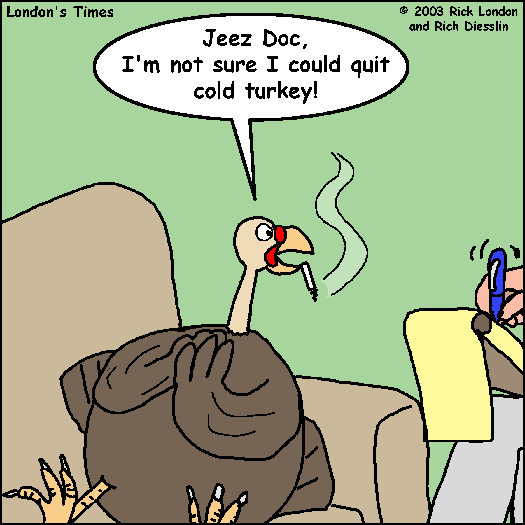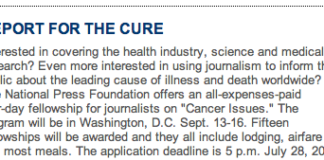 I started smoking when I was 9 years old, picking half-smoked butts off the street. I quit one day at the age of 23. I simply threw the half pack of cigarettes into the trash and never had another one since.
I started smoking when I was 9 years old, picking half-smoked butts off the street. I quit one day at the age of 23. I simply threw the half pack of cigarettes into the trash and never had another one since.
Now that’s cold turkey!
It turns out that cold turkey, which is definitely one of those “lifestyle changes” that PhRMA recommends DTC advertisers talk about in their ads, may be a better way to quit smoking in the long run than nicotine patches, gum, and anti-smoking drugs marketed by the pharmaceutical industry. So says, anyway, an article in today’s Wall Street Journal (see “Behind Antismoking Policy, Influence of Drug Industry“).
In the WSJ article you’ll find this interesting chart based on “population studies — which review results of people who already quit or tried to, rather than prospectively randomizing subjects into groups…” These studies suggest that “cold-turkey quitting can compete with medication in real-world situations.” (You old folks like me: Click on the chart for a larger view.)

Of course, GSK takes exception to this government study:
“Kenneth Strahs, GlaxoSmithKline’s vice president of smoking-control research and development, notes that his company’s products won approval from regulators at the Food and Drug Administration who demand randomized clinical trials. ‘The FDA does not conclude either safety or efficacy based on retrospective population studies,’ says Dr. Strahs.”
I’m sure the FDA will back you up on that Dr. Strahs.
Life Style Change Issue
But I what I want to ask is why did GSK , which markets Nicorette gum and nicotine-laced Commit lozenges for quiting smoking, create the “Don’t Go Cold Turkey” campaign focused on doctors? [This makes the cartoon shown on this page irrelevant if not humorous.]
It seems to me that coming out AGAINST a life-style change is against the spirit of PhRMA’s DTC Principle 9 (Information on Other Treatment Options) which encourages drug marketers to “include information about the availability of other options such as diet and lifestyle changes where appropriate for the advertised condition.”
[Yes, I know the DTC principles don’t apply here. But now I’m interested to see what GSK says in its Nicorette TV commercials about life style changes.]
If you go to GSK’s quit.com site (sponsored by Nicorette), you’ll find some anti-cold turkey statements in the FAQs:
Q: I’ve tried quitting before, but have always failed. Is my willpower just not strong enough?
A: Don’t be so hard on yourself! The success rate for people who try to quit cold turkey is a dismal 5%. The difference now is that we have a variety of stop-smoking Quit Aids that can increase your chances of success by lessening those awful withdrawal symptoms: irritability, lethargy, trouble concentrating and hunger.
I didn’t bother to find out where GSK came up with the 5% success rate for cold turkey as opposed to the 16% rate suggested by the National Cancer Institute, which is part of the The National Institutes of Health (NIH).
BTW, NIH got a very high rating in a recent Harris Interactive poll of US opinion of 13 federal agencies (“CDC, FAA, NIH, FDA, FBI and USDA Get the Highest Ratings of Thirteen Federal Government Agencies“).
Not that one thing has anything to do with another thing — NOT!.









![6 Digital Tools at the Center of Healthcare Digitalization [INFOGRAPHIC]](http://ec2-54-175-84-28.compute-1.amazonaws.com/pharma-mkting.com/wp-content/uploads/2021/04/6DigitalTools_600px-100x70.jpg)




